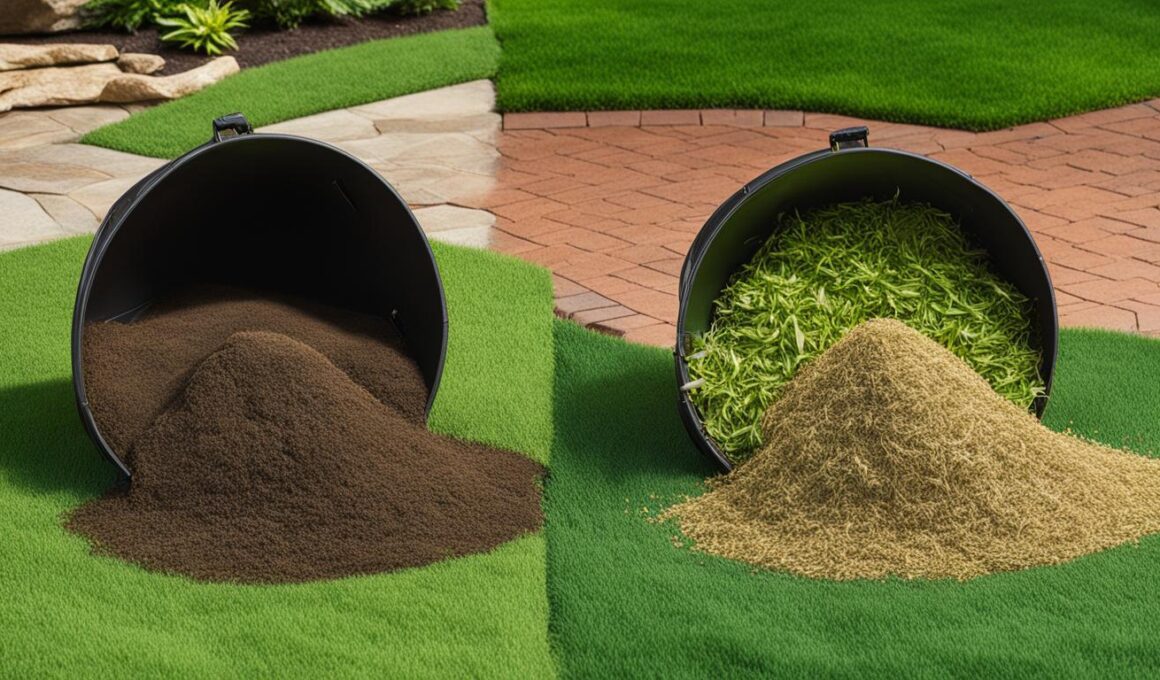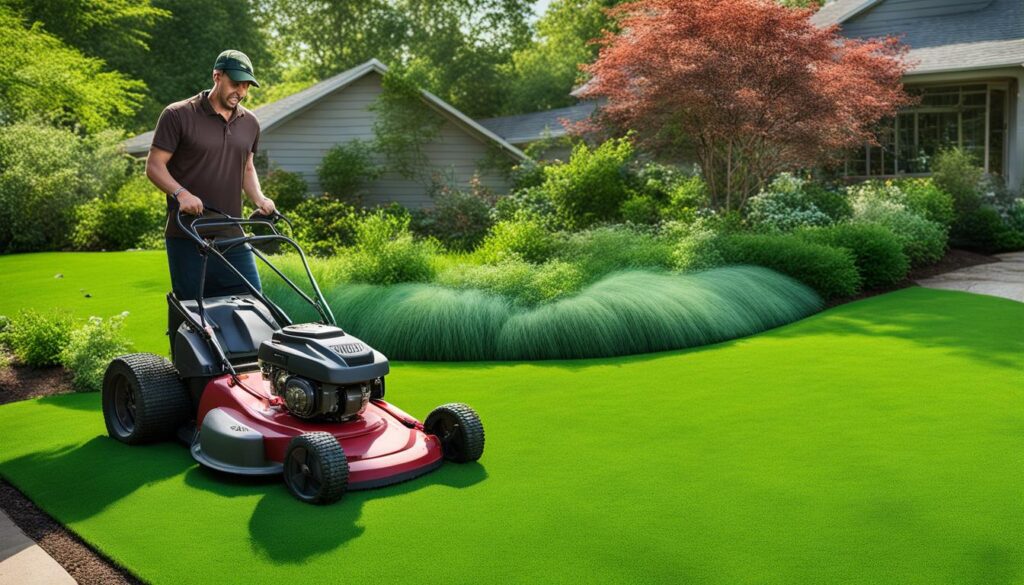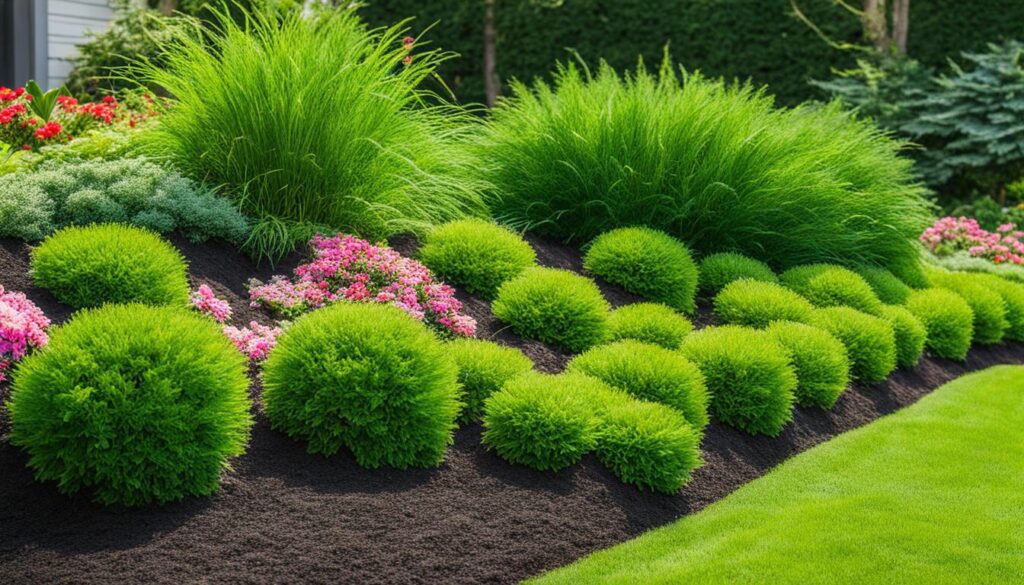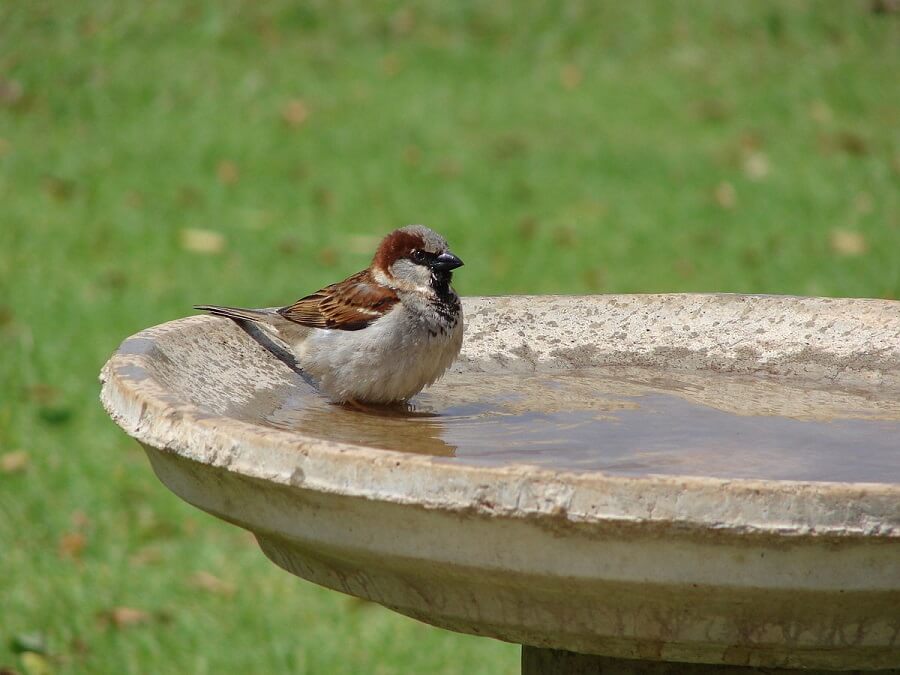Bagging or mulching grass clippings is an important decision for maintaining a vibrant and healthy lawn. While both options have their benefits, mulching has gained popularity for its ability to provide nutrients to the soil and reduce waste. In this article, we will explore the advantages of mulching and why it may be the best choice for your lawn care routine.
When considering bagging or mulching grass, it’s essential to understand the environmental impact and nutritional benefits of each method. By examining these factors, you can make an informed decision that aligns with your sustainability goals and promotes the long-term health of your lawn.
Key Takeaways:
- Mulching grass clippings helps reduce waste and contributes to a more sustainable lawn care routine.
- Mulching provides valuable nutrients to the soil, reducing the need for additional fertilizer and saving costs.
- Contrary to popular belief, mulching grass clippings does not contribute significantly to thatch build-up.
- Mulching mowers are preferred for regular maintenance as they eliminate the need for manual mulching or bagging.
- Proper mowing practices and regular maintenance are crucial to prevent issues associated with leaving excessive grass clippings on the lawn.
Environmental Impact of Bagging Grass Clippings
When it comes to the disposal of grass clippings, opting for bagging can have a significant environmental impact. Studies reveal that yard debris, including grass clippings, accounts for nearly 20% of the solid waste found in landfills. This not only increases overall waste but also consumes valuable space that could be used for other purposes.
By contrast, mulching your clippings provides a more sustainable solution. Mulching allows the grass clippings to decompose naturally and be recycled back into your lawn, reducing waste and minimizing the strain on landfills. It’s an environmentally friendly practice that can make a positive difference in your lawn care routine.
Not only does mulching help the environment, but it also has several advantages for your lawn. By allowing the clippings to remain on your lawn, you provide a natural source of nutrients that nourish the grass and promote its overall health. Additionally, mulching reduces the need for synthetic fertilizers, saving you both time and money.
Nutritional Benefits of Mulching Grass Clippings
Mulching grass clippings can provide significant nutritional benefits to your lawn. Research has shown that over a three-year period, clippings from lawns contained between 46% to 59% of nitrogen applied as fertilizer. By returning the clippings to your lawn instead of bagging them, you can effectively recycle these nutrients and reduce the need for additional fertilizer.
When you mulch grass clippings, they break down and release nutrients back into the soil. This process not only improves the soil’s nutrient content but also enhances its overall health and fertility. Nitrogen, an essential nutrient for plant growth, is particularly abundant in grass clippings.
By choosing to mulch your grass clippings, you can enjoy several benefits:
- Nutrient recycling: Mulching returns valuable nitrogen, along with other nutrients, to your lawn, providing a natural fertilizer source that promotes healthy growth.
- Cost savings: With the nutrients from grass clippings nourishing your lawn, you can reduce your reliance on store-bought fertilizers, saving you money in the long run.
- Environmental sustainability: Mulching grass clippings reduces waste and landfill space, contributing to a more sustainable lawn care routine.
Did you know? Research has found that grass clippings contain nutrients similar to those in commercial fertilizers. By mulching them back into your lawn, you’re essentially recycling these beneficial nutrients and promoting a healthier, greener lawn.
Dispelling the Myth of Thatch Build-Up
One common misconception about mulching grass clippings is that it contributes to thatch build-up. However, this is not entirely accurate. Grass clippings are made up of mostly water and decompose quickly, making them unlikely to contribute significantly to thatch. Thatch build-up is more commonly caused by other factors such as compacted soil or over-application of fertilizer.
In fact, mulching grass clippings can actually benefit your lawn by returning valuable nutrients back to the soil. When you mulch your clippings, they break down and release nutrients that can be absorbed by the grass, promoting healthy growth.
To effectively manage thatch build-up, it is important to address the underlying causes. Regular soil testing can help you determine if your soil is compacted and in need of aeration. Core aeration, which involves removing small plugs of soil, helps improve airflow, water absorption, and overall soil health.
Ensuring the pH balance of your soil is also essential. If the pH is too high or too low, it can inhibit the breakdown of thatch. Adjusting the pH through proper fertilization and the application of lime or sulfur, if necessary, can help create optimal conditions for thatch decomposition.
By dispelling the myth of thatch build-up from mulching grass clippings, you can confidently embrace this sustainable lawn care practice and enjoy the benefits it brings to your lawn’s health and overall aesthetics.
Image:
Mowing Equipment Options: Mulching vs. Bagging Mowers
When it comes to mowing your lawn, choosing the right equipment is essential for maintaining a healthy and manicured yard. Two popular options to consider are mulching mowers and bagging mowers. Understanding the differences between these mowing techniques can help you make an informed decision based on your lawn care needs.
Mulching mowers are designed to chop grass clippings into finer pieces, which are then distributed back onto the lawn. This process speeds up decomposition, allowing the clippings to serve as a natural fertilizer. The result is a greener, healthier lawn without the need for manual mulching or bagging. Mulching mowers offer convenience and efficiency, making them ideal for regular mowing maintenance.
Bagging mowers, on the other hand, collect grass clippings in an attached bag as you mow. This option requires additional effort as you need to manually empty the bag and dispose of the clippings. Bagging mowers are useful in situations where you prefer a manicured appearance or when excessive grass clippings may hinder the health of your lawn. However, it’s important to note that bagging requires extra time and physical labor.
Ultimately, the choice between mulching and bagging mowers depends on your lawn care preferences and the condition of your yard. If you value simplicity and want to enhance the health of your lawn, mulching mowers are the way to go. However, if you prioritize a pristine appearance or have specific lawn care requirements, bagging mowers can be a suitable option. Consider the time, effort, and desired outcome when selecting the right mowing equipment for your needs.
Potential Issues with Leaving Grass Clippings
While mulching grass clippings is generally beneficial, it’s important to be mindful of potential issues that can arise when leaving excessive clumps and thick matting of clippings on your lawn. These issues can lead to discoloration and even the death of certain areas of your grass.
To prevent these problems, it’s recommended to mow your lawn more frequently and remove only one-third of the grass blade with each mowing. This ensures that the clippings are not left in large, noticeable clumps that can impede the growth of your grass.
Regular maintenance and proper mowing practices are essential for a healthier and more aesthetically pleasing lawn. By adhering to these guidelines, you can avoid potential issues associated with leaving grass clippings and maintain a vibrant, lush lawn.
Other Uses for Grass Clippings
If you’re not mulching or bagging your grass clippings, there are other ways to utilize them. You can collect them for composting, use them in your garden, or create natural fertilizers. Properly utilizing grass clippings reduces waste and provides additional benefits for your lawn and garden.
Conclusion
When it comes to taking care of your lawn, the decision to bag or mulch grass clippings is one that depends on your lawn’s specific needs and your environmental preferences. While bagging may be necessary in certain situations, mulching offers a range of benefits that make it the preferred choice for many homeowners.
Mulching grass clippings allows for nutrient recycling, as the clippings break down and release valuable nutrients back into the soil. This natural process not only saves you money on additional fertilizer but also promotes a healthier and greener lawn in the long run.
Additionally, mulching grass clippings is an environmentally sustainable practice. By returning the clippings to your lawn, you can reduce waste and contribute to a more eco-friendly lawn care routine. On the other hand, bagging grass clippings adds to the solid waste in landfills, taking up valuable space and increasing overall waste levels.
When making your lawn care choice, consider the factors discussed in this article. Think about the nutritional benefits of mulching, the environmental impact of bagging, and the overall maintenance requirements of your lawn. By weighing these factors and understanding the unique needs of your lawn, you can make an informed decision that will result in a healthier, greener, and more sustainable outdoor space.
Which Lawn Care Choice is Best for Maintaining a Healthy Lawn?
When it comes to maintaining a healthy lawn, choosing the right lawn care equipment is crucial. A quick lawn mower deck repair can ensure that your mower is in good working condition, allowing you to efficiently cut your grass and keep your lawn looking its best.
FAQ
Is bagging or mulching grass clippings better for my lawn?
Mulching grass clippings is generally recommended for a healthier, greener lawn. However, there are certain situations where bagging may be necessary.
What is the environmental impact of bagging grass clippings?
Bagging grass clippings can increase overall waste and take up valuable space in landfills. Mulching your clippings reduces waste and contributes to a more sustainable lawn care routine.
What are the nutritional benefits of mulching grass clippings?
Mulching grass clippings provide valuable nutrients to your lawn. Research has shown that clippings contain a significant amount of nitrogen, reducing the need for additional fertilizer and resulting in cost savings and a healthier lawn.
Does mulching grass clippings contribute to thatch build-up?
Grass clippings decompose quickly and are unlikely to contribute significantly to thatch. Excessive thatch is typically caused by other factors such as compacted soil or over-application of fertilizer.
What is the difference between mulching and bagging mowers?
Mulching mowers chop grass clippings into finer pieces for faster decomposition, while bagging mowers require additional effort to collect and dispose of clippings. Mulching mowers are preferred for regular mowing as they eliminate the need for manual mulching or bagging.
What potential issues can arise from leaving grass clippings on the lawn?
Leaving excessive clumps and thick matting of grass clippings on the lawn can discolor and even kill areas of grass. Mowing more frequently and removing only one-third of the grass blade with each mowing can help prevent these issues.
Are there other uses for grass clippings besides mulching or bagging?
Yes, you can collect grass clippings for composting, use them in your garden, or create natural fertilizers. Properly utilizing grass clippings provides additional benefits for your lawn and garden.
What should I consider when choosing whether to bag or mulch grass clippings?
The choice between bagging or mulching grass clippings is ultimately a personal one, based on your lawn’s specific needs and your environmental preferences. Consider the benefits discussed in this article to make the best lawn care choice for your yard.









